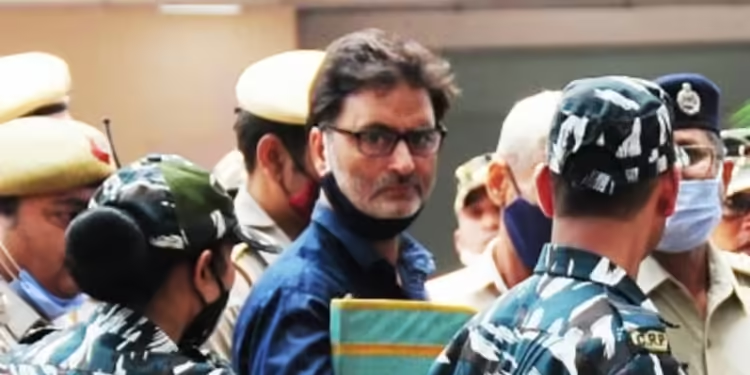The Supreme Court on Thursday suggested establishing a makeshift courtroom within the jail premises to allow for the physical cross-examination of terror convict Yasin Malik in two cases of kidnapping and murder pending trial before a Jammu court [Central Bureau of Investigation v. Mohd Yasin Malik].
The Jammu court had previously directed Malik’s physical presence, but authorities cited significant security risks in transferring him from Delhi’s Tihar Jail to Jammu.
A bench comprising Justices Abhay S Oka and Augustine George Masih proposed the in-jail courtroom as a solution.
“In our country, even Ajmal Kasab was afforded a fair trial. A courtroom can be set up in jail for this purpose. Consider how many witnesses need security, and arrangements must be made for a judge to preside in the jail exclusively for this trial,” remarked Justice Oka.
The Court was hearing an appeal by the Central Bureau of Investigation (CBI) challenging the Jammu court’s order requiring Malik’s physical presence during trial proceedings.
Representing the CBI, Solicitor General (SG) Tushar Mehta reiterated that the agency does not support transferring Malik to Jammu.
“Malik is not just another terrorist. He frequently travelled to Pakistan and shared the stage with Hafeez Saeed. Security concerns are paramount, and in cases like this, the government cannot adhere strictly to procedural norms,” Mehta argued.
However, Justice Oka questioned the viability of conducting cross-examinations via video conferencing. “How can cross-examinations happen in VC?” he asked.
“If he insists on personal presence, the trial could be shifted to Delhi,” SG Mehta suggested, adding that trials in jail have occurred in the past, citing Gujarat as an example.
The Supreme Court allowed the CBI to add all co-accused in the case as respondents to its appeal and scheduled the next hearing for November 28.
Background of the Case
The Jammu special court sought Malik’s appearance for cross-examining witnesses in two cases: the 1989 killing of four Indian Air Force (IAF) personnel and the abduction of Rubaiya Sayeed, daughter of former Jammu and Kashmir Chief Minister Mufti Muhammad Sayeed.
The CBI challenged this directive in the Supreme Court, which issued a stay in April 2022.
In July 2023, Malik was physically present during a Supreme Court hearing after notifying jail authorities of his intent to attend. This sparked controversy, with SG Mehta later writing to Home Secretary Ajay Bhalla, highlighting the significant security lapse and risks associated with Malik’s appearance, including the possibility of escape or assassination.
Recent Developments
Malik has approached the Delhi High Court to seek medical treatment at AIIMS, arguing that authorities are preventing his physical production in Court under the pretext of an order issued under Section 268 of the Code of Criminal Procedure (CrPC), which restricts a prisoner’s movement from jail. He has urged the Delhi High Court to revoke this order and allow his physical presence in Court when required.

















